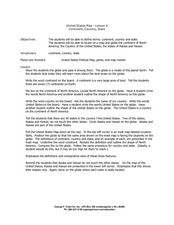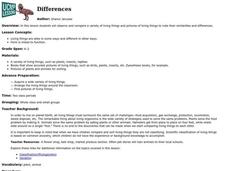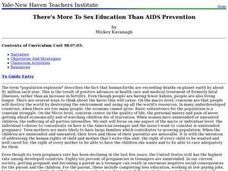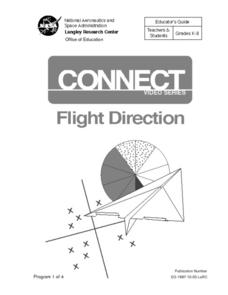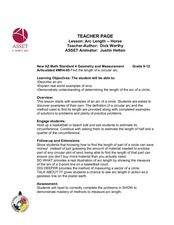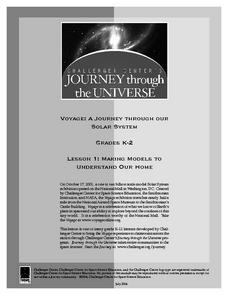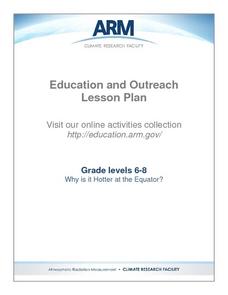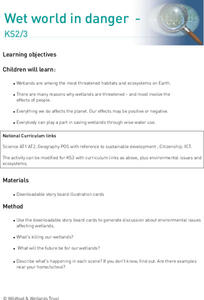Curated OER
Plotting Data on a Graph
Learners investigate graphing. In this graphing lesson, students survey the class and create graphs to reflect the data collected.
Curated OER
The Mathematical Fingerprint of Our Solar System
Students study the beautiful mathematical model unique to our solar system.
Curated OER
Pond Ecology
Fifth graders examine pond ecology, testing how temperature affects the respiration rate of fish. They collect various living things found at a pond, and identify the animal and plant life discovered. They observe a pond community in an...
Curated OER
I'm Falling For You!
Third graders are introduced to the concept of gravity by observing different objects being dropped from a high point. In groups, they complete the same activities Galileo did and record their observations. To end the lesson, they...
Curated OER
Pollution - What is It Doing to Us?
Students recognize some forms of pollution. In this science lesson plan, students recognize and understand some of the devastating effects of the acid rains and other possible factors that are contrary to the pH balance of nature.
Curated OER
It's A Jungle in Here!
Fifth graders research rainforest destruction. In this geography and ecology lesson, 5th graders work as a group to research the effects of logging, farming, and mining on the rainforest. Students gather and display data and information...
Curated OER
Making a Globe
Students participate in a creative project where they construct globes. They label specific places on the globe that helps them learn how to read an actual globe.
Curated OER
Martha Who?
Students explore how the number and types of organisms an ecosystem can support depends on the resources available and on abiotic factors, such as quantities of light and water, a range of temperatures, soil composition. They are...
Curated OER
United States Map- Continent, Country, State
Students identify their continent, country, and state on a globe. In this geography instructional activity, students use a globe to identify the seven continents, the United States, and the state which they live in. Students define key...
Curated OER
United States Map
Students compare the United States on a globe and on a map. In this map lesson, students relate the sizes of the continents and locate the United States. Students identify the location of the continental US as well as Alaska and Hawaii.
Curated OER
Habitat
Fourth graders study the components of a habitat. In this animal habitat lesson, 4th graders define the elements of a habitat. Students discuss intertidal habitats and make a habitat for a crab.
Curated OER
Differences
Students observe and compare a variety of living things and pictures of living things to note their similarities and differences.
Curated OER
There's More To Sex Education Than AIDS Prevention
Students are introduced to the views on sexuality in the United States. In groups, they research data from five countries and compare them with the United States. Using the information, they develop reasons why the teenage pregnancy...
Curated OER
Flight Direction
Students are introduced to NASA's Connect Series and Flight Direction programs. They explore the world of aeronautics and their missions. Students receive a front role set to the concepts and skills involved with the various NASA programs.
Curated OER
Arc Length - Horse
Students define an arc and calculate its length. In this geometry lesson plan, students find examples of arc in the real world. They show their understanding of arcs through problem solving.
Curated OER
Tide Types
Young scholars record hourly reading for water height for 24 hours and determine whether a location experiences diurnal, semi-diurnal or mixed tides. Links are present for the information. Students predict high and low tide, and answer a...
Curated OER
Making Models To Understand Our Home
Students investigate the concept of a model and how it is used to represent something that is real. They recognize how the model can be applied to other types of concepts like the solar system. Students create a scale drawing of a house...
Curated OER
Water and Ice
Students investigate how water goes from a solid to a liquid then back again. In this experimental activity students conduct their own experiment and see how water changes form.
University of Colorado
Phases of Charon
Charon, the largest of Pluto's moons, was discovered in 1978. Lesson is a walk through of how to solve for the phases of Charon. It uses two different points on Pluto and takes into account the tilt of the pole, the rotational axis, and...
Curated OER
Why Is It Hotter At the Equator?
Students investigate the different heating effects of sunlight. They conduct an experiment that demonstrates the way sunlight strikes the equator, the poles and other parts of the globe.
Curated OER
Location
Students explore the tools used by Columbus to chart his latitude. They study the change of a location over time.
Curated OER
Wet World in Danger
Students investigate the reasons why wetlands are threatened especially by people. They study the wise use of water to preserve wetlands.
Curated OER
Bugs, Bugs, Everywhere!
Young scholars collect and compare bugs using magnifying lenses and graph data based on their comparisons. In this bugs lesson plan, students also make an aspirator by using a jar, tubing, and screen.











